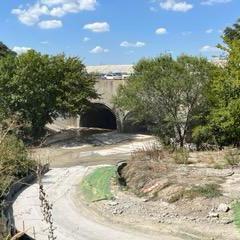Advanced Concrete, Cement & Mortar Testing

With our advanced concrete, cement and mortar laboratory, Braun Intertec can design and recommend complex concrete solutions to many types of projects. Design mixtures can be evaluated in-house from the design process to agency reporting to meet required design specifications, handling and curing requirements, and are tested and reported to your needs.
Mix Design Trail Batching & Testing
A successful project starts with a great mix design. We produce mix design which considers workability, pumpability, high-strength mixture, set time, underwater concrete placement, long-term durability, and economics. Braun Intertec tests the mixture in the lab under many different environments using state-of-the-art batching lab and various environmental chambers.
Test Methods
- ASTM C192, standard practice for making and curing concrete test specimens in the laboratory
- ASTM C143, standard test method for slump of hydraulic cement concrete
- ASTM C231, standard test method for air content of freshly mixed concrete by the pressure method
- ASTM C138, standard test method for density (unit weight), yield, and air content (gravimetric) of concrete
- ASTM C1064, standard test method for temperature of freshly mixed hydraulic cement concrete
- ASTM C666, standard test method for resistance of concrete to rapid freezing and thawing
- ASTM C39, standard test method for compressive strength of cylindrical concrete specimens
- ASTM C1074, standard practice for estimating concrete strength by the maturity method
- ASTM C78, standard test method for flexural strength of concrete (using simple beam with third-point loading)
- ASTM C157, standard test method for length change of hardened hydraulic cement mortar and concrete
- ASTM C496, standard test method for splitting tensile strength of cylindrical concrete specimens
- ASTM C403, standard test method for time of setting of concrete mixtures by penetration resistance
- ASTM C469, standard test method for static modulus of elasticity and poisson’s ratio of concrete in compression
- ASTM C1556, standard test method for determining the apparent chloride diffusion coefficient of cementitious mixtures by bulk diffusion
- ASTM C512, standard test method for creep of concrete in compression
- ASTM C1579, standard test method for evaluating plastic shrinkage cracking of restrained fiber-reinforced concrete (using a steel form insert)
- ASTM G109, standard test methods for determining effects of chemical admixtures on corrosion of embedded steel reinforcement in concrete exposed to chloride environments
- ASTM C1581, standard test method for determining age at cracking and induced tensile stress characteristics of mortar and concrete under restrained shrinkage
- ASTM C1609, standard test method for flexural performance of fiber-reinforced concrete (using beam with third-point loading)
- CRD C-48, standard test method for water permeability of concrete
- DIN 1048, testing of hardened concrete
- CRD C-661, specification for antiwashout admixtures for concrete
- ASTM C309, standard specification for liquid membrane-forming compounds for curing concrete
- ASTM C1315, standard specification for liquid membrane-forming compounds having special properties for curing and sealing concrete
- ASTM C882, standard test method for bond strength of epoxy-resin systems used with concrete by slant shear
- ASTM C1585, standard test method for measurement of rate of absorption of water by hydraulic cement concretes
Concrete Durability Testing
Construction of sustainable and resilient structures require concrete mixtures that provide the correct properties for long-term durability. Our accredited laboratories are equipped to test concrete for various durability properties from the basic air content to sulfate resistance to permeability of concrete.
Test Methods
- ASTM C1152, standard test method for acid-soluble chloride in mortar and concrete
- ASTM C 1260, standard test method for potential alkali reactivity of aggregates (mortar-bar method)
- ASTM C 1567, standard test method for determining the potential alkali-silica reactivity of combinations of cementitious materials and aggregate (accelerated mortar-bar method)
- ASTM C1293, standard test method for determination of length change of concrete due to alkali-silica reaction
- ASTM C666, standard test method for resistance of concrete to rapid freezing and thawing
- ASTM C672, standard test method for scaling resistance of concrete surfaces exposed to deicing chemicals
- ASTM C1202, standard test method for electrical indication of concrete’s ability to resist chloride ion penetration
- ASTM C1556, standard test method for determining the apparent chloride diffusion coefficient of cementitious mixtures by bulk diffusion
- ASTM C1012, standard test method for length change of hydraulic cement mortars exposed to a sulfate solution
- ASTM C157, standard test method for length change of hardened hydraulic cement mortar and concrete
- ASTM C878, standard test method for restrained expansion of shrinkage-compensating concrete
- CRD C-48, standard test method for water permeability of concrete
- DIN 1048, testing of hardened concrete
- ASTM C779, standard test method for abrasion resistance of horizontal concrete surfaces, method C
Cement & Mortar
Braun Intertec works with a range of clients from ready-mix producers to manufactures of new cementitious materials by testing their products in accordance with current industry standards and consulting on the results. We are ready to test your cementitious materials, aggregates, or admixtures. We have helped develop new products used for grout and mortar nationwide, along with new supplementary cementitious materials.
Test Methods
- C452, standard test method for potential expansion of portland cement mortars exposed to sulfate
- C1038, standard test method for expansion of hydraulic cement mortar bars stored in water
- C452, standard test method for potential expansion of portland cement mortars exposed to sulfate
- C114, standard test methods for chemical analysis of hydraulic cement
- C305, standard test method for mechanical mixing of hydraulic cement pastes and mortars of plastic consistency
- C204, standard test method for fineness of hydraulic cement be air-permeability apparatus
- C188, standard test method for density of hydraulic cement
- C191, standard test method for time of setting of hydraulic cement by vicat needle
- C266, standard test method for time of setting of hydraulic cement paste by gillmore needles
- C187, standard test method for amount of water required for normal consistency of hydraulic cement paste
- C204, standard test method for fineness of hydraulic cement by air-permeability apparatus
- C430, standard test method for fineness of hydraulic cement by the 45-µm (no. 325) sieve
- C451, standard test method for early stiffening of hydraulic cement (paste method)
- C359, standard test method for early stiffening of hydraulic cement (mortar method)
- C311, standard test method for sampling and testing fly ash or natural pozzolans for use in portland cement concrete
- C618, standard test method for coal fly ash and raw or calcined natural pozzolan for use in concrete
- C151, standard test method for autoclave expansion of portland cement
- C185, standard test method for air content of hydraulic cement mortar
- C441, standard test method for effectiveness of pozzolans or ground blast-furnace slag on preventing excessive expansion of concrete due to the alkali-silica reaction
- C1012, standard test method for length change of hydraulic cement mortars exposed to a sulfate solution
- C150, standard specification for portland cement
- C270, standard specification for mortar for unit masonry
- C780, standard test method for preconstruction and construction evaluation of mortars for plain and reinforced unit masonry
- C109, standard test method for compressive strength of hydraulic cement mortars (using 2-in. or [50 mm] cube specimens)


